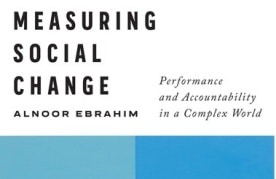 The WIEGO Statistics Programme is featured in a chapter of the recently published book Measuring Social Change: Performance and Accountability in a Complex World by Alnoor Ebrahim (Stanford University Press).
The WIEGO Statistics Programme is featured in a chapter of the recently published book Measuring Social Change: Performance and Accountability in a Complex World by Alnoor Ebrahim (Stanford University Press).
At a time when social sector services are unable to keep up with societal need in a world of rapidly rising inequality, and governments are stretched beyond their means, the book looks at one of the fundamental dilemmas facing leaders as they navigate social change: performance measurement.
In Chapter 4, Ebrahim examines an "emergent strategy" in global policy advocacy work, where the relationship between cause and effect is complex, and where an organization's ability to control policy outcomes is limited, thus requiring collaboration with others in its network. He illustrates this strategy through the case of the WIEGO Statistics Programme.
Ebrahim notes that while WIEGO cannot directly attribute improvements in the working conditions of informal workers to its statistical interventions (outcomes), it can reasonably claim to have "influenced" global and national public standards on measuring the informal sector (interim outcomes). And he observes that executing such a strategy requires a performance system based on adaptation, allowing the organization to quickly act on new opportunities to influence key actors within its organizational ecosystem. Such a performance system, exemplified by the case of WIEGO, is relevant to a diverse range of social interventions.
Read Measuring Social Change.
